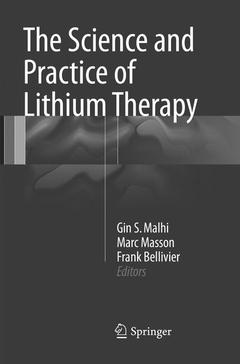The Science and Practice of Lithium Therapy, 1st ed. 2017
Coordonnateurs : Malhi Gin S., Malhi Gin S., Masson Marc, Masson Marc, Bellivier Frank, Bellivier Frank

This book provides a clear and comprehensive guide to the clinical prescription of lithium that draws upon evidence-based knowledge of its mechanisms of action. The book is divided into two parts, on the science of lithium and the practice of lithium therapy. The former covers aspects such as the properties of the lithium ion, pharmacokinetics and pharmacodynamics, impact on neurotransmission, and gene expression modulation. The section on practice includes discussion of variability in response to lithium, use of lithium in the treatment of bipolar disorders, its value in suicide prevention, administration during pregnancy and in the pediatric age group, and side effects. Lithium is arguably the only true mood stabilizer, and its multifaceted effects across many clinical domains have given rise to a resurgence of interest in recent years, fuelled by both researchers and clinicians. Nevertheless, its use remains constrained by exaggerated concerns about potential side-effects. In reality, lithium is a simple molecule that is relatively straightforward to administer and monitor and has potentially profound benefits at a fraction of the cost of contemporary agents. This book dispels the many myths and concerns that surround its use and will be of interest for clinicians and researchers worldwide, and those that are recipients of lithium therapy.
Gin S. Malhi, BSc Hons), MBChB, FRCPsych, FRANZCP, MD is Professor of Psychiatry and Chair in the Faculty of Medicine at the University of Sydney. He is Department Head at Royal North Shore Hospital where he is Director of the CADE Clinic, and Medical Director of the Mood Disorders Unit at Northside Clinic, Sydney. After graduating with degrees in Pharmacology and Medicine from the University of Manchester (UK), he completed his psychiatry training in Cambridge and then the Bethlem and Maudsley Hospitals in London. As a Clinical Lecturer at the Institute of Psychiatry (IOP) in London he pursued research in depression and psychosurgery, and upon moving to Sydney (Australia) in 1999 he began research in neuroimaging and bipolar disorder at the University of New South Wales (UNSW). Since 2003 he been a Chief Investigator on successive National Health Medical Research Council (NHMRC) Program Grants and during this time he has published more than 400 papers and 20 books/book chapters. After serving as Editor-in-Chief of Acta Neuropsychiatrica he has been the Editor-in-Chief of the Australian and New Zealand Journal of Psychiatry since 2010 and is now also an Editor of Bipolar Disorders. In 2013 he received the Royal Australian and New Zealand College of Psychiatrists (RANZCP) Senior Academic Researcher Prize, and then in 2015 the RANZCP College Citation, and in the same year the Mogens Schou Award from the International Society of Bipolar Disorders for Education and Teaching. In 2016, in recognition of his many achievements, he received the Distinguished Professor Award from the University of Sydney.
Marc Masson, MD, is a Psychiatrist and the Medical Director of the Nightingale Hospital Paris-Clinique du Château de Garches and Consultant, Service Hospitalo-Universitaire, Centre Hospitalier Sainte-Anne, Paris, France. After graduating from Bordeaux University in France, he worked as a psychiatrist at Assistance Publique Hôpitaux de Paris (APHP). He
Date de parution : 07-2018
Ouvrage de 342 p.
15.5x23.5 cm
Date de parution : 12-2016
Ouvrage de 342 p.
15.5x23.5 cm
Thèmes de The Science and Practice of Lithium Therapy :
Mots-clés :
Bipolar Disorders; Lithium; Lithium Ion; Lithium in Bipolar Disorder; Mood Stabilizer; Neurobiological Pathways; Pharmacodynamics of Lithium; Pharmacokinetics of Lithium; Psychopharmacology; Mania; Depression; Suicide; Neuroprotection; Augmentaton Therapy; Manic-Depressive Illness; pharmacotherapy



